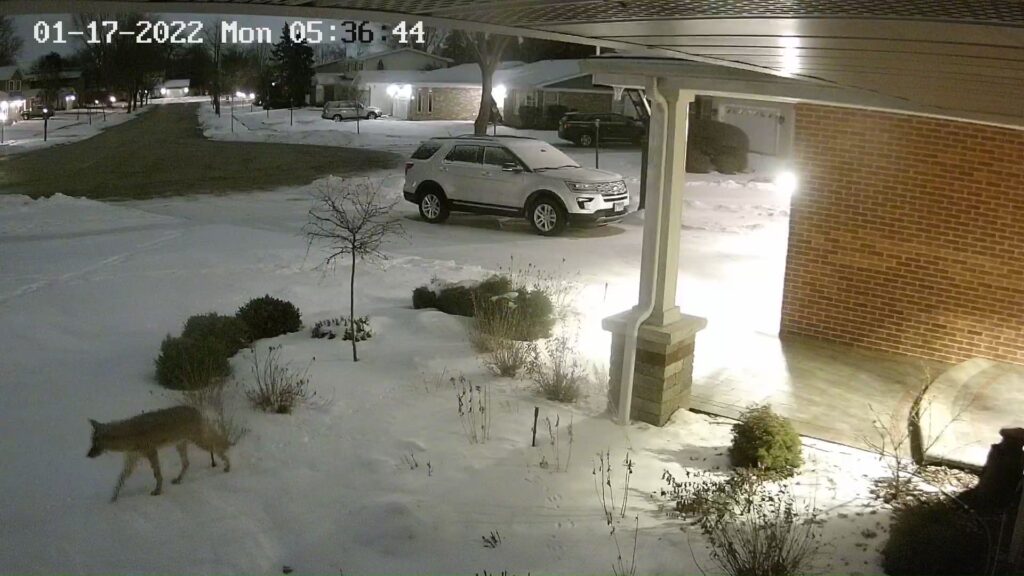
Coyotes are amazing creatures. They are very adaptable and can survive in almost any environment even in close proximity to humans where it appears they thrive. One fact remains however, they are a medium size predator and do what medium size predators do, which brings them into conflict with humans. Coyotes are either despised or revered, but somewhere in the middle is the true coyote. If you seek the truth about coyotes, you will find a lot of information and a lot of misinformation. Based on my experience, I feel the misinformation is one of the reasons communities are experiencing problems with coyotes. The misinformation leads people to believe we can co-exist with all coyotes. Some we can, some we cannot.
One example of misinformation is “hazing” or simply scaring the animal away will work. Research has proven that hazing a habituated coyote does not work because there is no real negative impact for the animal.
“Coyotes are protected in Illinois so nothing can be done about them.” This is also a false statement. Coyotes can be hunted year-round and there is no limit to the number of coyotes you can harvest. They can be hunted twenty-four hours a day between mid-November until mid-March. All that is required is that the hunter is licensed and possess a habitat stamp.
Another example of misinformation is the statement “We moved into the coyote’s territory.” Coyotes did not really start becoming abundant in Illinois until 1979. The way that we design and build our communities has provided a lush living area for coyotes, so the coyote has actually moved in on us.
“If you walk your dog on a six-foot leash it will protect your dog from coyote attacks.” This is another example of misinformation. There are ample news stories from around the country that proves this false.
Many agencies and special interest groups preach to co-exist with coyotes. Some of their information has merit. The co-exist group tells us what we need to do to get along with coyotes. The major flaw in this thinking is that the coyote never reads the guidelines. They are wild animals and will always do what wild animals do.
We believe, based on scientific research and our experience managing problem coyotes, that coyotes cannot be relocated. Feeding coyotes will create problems for you and your pets. It has been scientifically proven that human food is detrimental to a coyote’s health, so when you think you are helping the animal you are actually contributing to its death.
Coyotes that are sick, habituated or aggressive need to be removed from the community. Often only one or two animals need to be removed to solve the immediate problem. Research has also proven that sick/injured coyotes are five times more likely to interact with humans.
For more information, please view our blog posts for truthful information about coyotes.
Feel free to contact us. Questions will be answered promptly. Inquiries are always welcome.
Dave Munch
Reece Bend
Coyotes started to move into Illinois in 1979. At that time, I was a Detective with the local Sheriff’s Department. I later retired as a Lieutenant with thirty years of experience. Because of these positions, I knew quite a few rural landowners. Once the coyotes became well established it seemed like my conversations with the landowners always included the problems they were having with the coyotes.
I volunteered one time to help a resident and quickly learned a deep respect for the coyotes’ abilities. It was apparent that I needed more information. I enlisted the help of the three best Animal Damage Control people I could find in the western states. I am truly grateful for the information these men shared and are still close friends with them to this day.
I have approximately forty years’ experience solving coyote issues for residents. The last years have been almost exclusively in the urban environment, Chicago suburbs to be specific. I am confident we can work out a solution to coyote issues that may arise.
I possess a Class A Nuisance Wildlife Permit issued by the Department of Natural Resources and I am fully insured.
Reece works in the agriculture industry and operates his own farm. Reece like Dave began to get questions from area residents about solving issues created by coyotes.
Reece then approached Dave about different methods used to solve coyote problems. Reece and I have worked together for the last ten years, the past two years Reece has worked in the urban environment helping resolve coyote problems.
Reece holds a Class A Nuisance Animal Permit issued by the State of Illinois and is Insured.